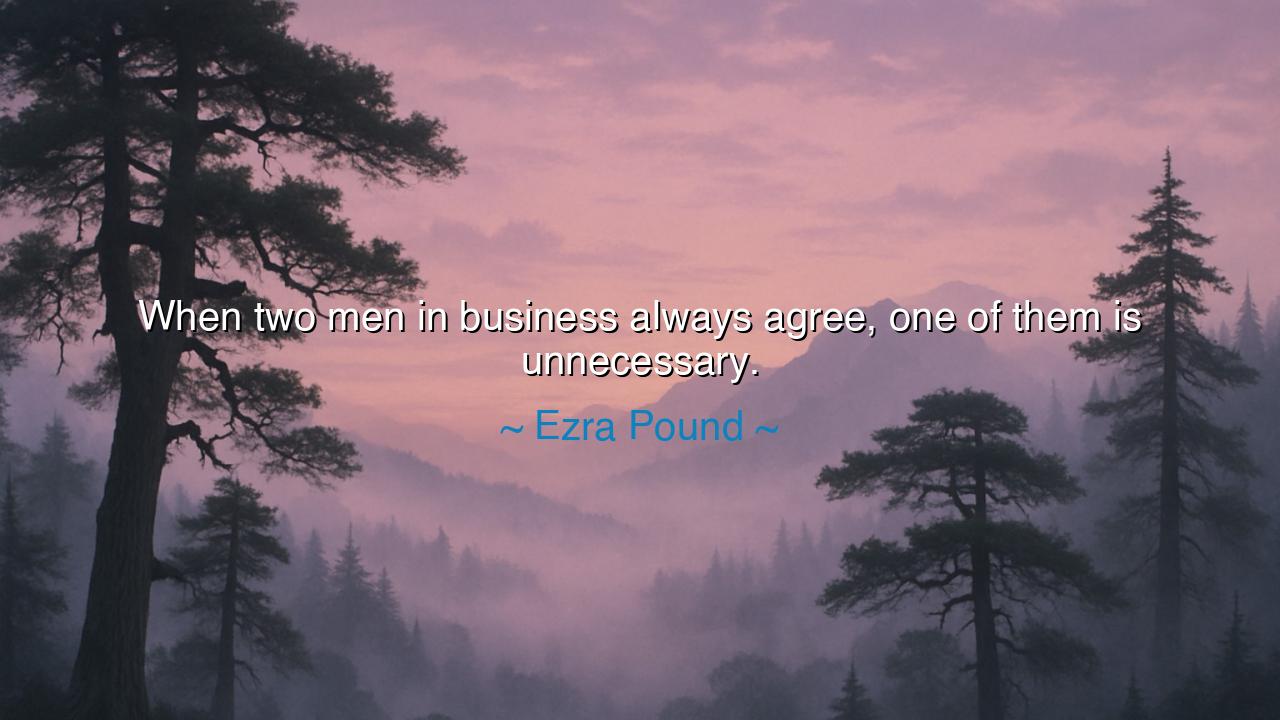
When two men in business always agree, one of them is






Hear the sharp and paradoxical wisdom of Ezra Pound, who declared: “When two men in business always agree, one of them is unnecessary.” These words, though spoken with wit, cut to the very heart of human enterprise. For in them is revealed a truth that rings across centuries: progress is not born from constant harmony, but from the clash of minds, the tempering of ideas, and the fire of disagreement that forges better paths.
The meaning is plain yet profound. If two partners in business are always in agreement, then one contributes nothing new, offering only an echo of the other. Agreement without challenge is but a stagnant pond—still, unchanging, and soon to decay. But disagreement, properly harnessed, is the flowing river that shapes the valley, carrying away weakness and carving out strength. Thus, Pound teaches that the value of partnership lies not in sameness, but in the fruitful tension of differing visions.
History bears witness to this truth. Consider the partnership of Thomas Edison and his assistant, Francis Upton. Edison, a man of relentless experimentation and bold imagination, often clashed with Upton, who was more cautious and mathematical in his reasoning. Their disagreements were fierce, yet out of this conflict came the perfection of the electric light. Had Upton only agreed with Edison, errors would have multiplied; had Edison yielded to Upton’s caution, progress might have stalled. Their disagreements became the furnace in which innovation was refined.
Another mirror is found in the founding of the United States. The debates between Thomas Jefferson and Alexander Hamilton were sharp and unyielding. Jefferson feared centralized power; Hamilton sought a strong federal system. Their visions clashed in the young Republic, yet from this struggle arose a balance that shaped the enduring structure of American government. If either voice had been silenced, the Republic would have been poorer. Their disagreement was not destruction, but creation.
Therefore, O listener, let not the presence of conflict in partnership trouble you. When pursued with honesty and respect, it is the sign of vitality. Better to be challenged by a partner who forces you to defend and refine your ideas than to be lulled by constant approval. A partner who disagrees is a mirror that shows you what you cannot see alone, a hammer that strikes sparks from stone, a guide who keeps you from stumbling down a single narrow path.
The lesson is clear: do not fear disagreement, but embrace it as the soil of growth. If you are in business, in friendship, or in union, seek not only harmony but also honesty. Invite challenge, for it will save you from folly. Encourage debate, for it will sharpen your vision. And when you yourself must disagree, do so not with malice but with courage, remembering that truth is often revealed in the tension of opposing views.
Practical is this counsel: when working with others, listen deeply, welcome contradiction, and examine it with humility. Ask not, “Why does my partner oppose me?” but rather, “What truth lies hidden in their resistance?” Let every disagreement become a chance to test your resolve and purify your purpose. In this way, the fire of conflict becomes the forge of wisdom, and no voice in the partnership is wasted.
So remember Pound’s wisdom: “When two men in business always agree, one of them is unnecessary.” Agreement without challenge is emptiness, but disagreement with respect is the path to greatness. Therefore, let your partnerships be alive with dialogue, alive with debate, alive with the creative friction that gives birth to new worlds. For in the sparks struck between minds, the future itself is kindled.






AAdministratorAdministrator
Welcome, honored guests. Please leave a comment, we will respond soon